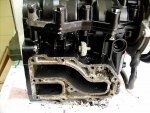Still not an expert (lol)...
This is interesting though..
I might consider the commercial fisherman's comments to be more like there aren't many used 4 strokes compared to 2 strokes, because the first owners aren't giving them up?...
(Ok, maybe not, but it's one interpretation.. )
As for longevity and people maintaining cars..
Most folks will get the oil changed.. That's it.. (in cars..)
Just doing that, they can go to 75K miles minimum usually.. (More if air filter, pcv valve etc.. are maintained..)
Cars also average about 12-1500rpm in cruising (I think it is anyway..).. That's almost Idle on muffs for most outboards..
To maintain an outboard, we're looking at what?
Oil changes in 4 stroke (same as cars)
2 strokes.. Gas/oil mix.. Were we off a little one time or another (increased wear..)
Winter storage if applicable (water drained? Freeze damage)
Water pump/impeller...
Not to mention, most people aren't running their cars through puddles each and every time they use them.
We're running through the best puddles with our outboards!!

I know general aviation mandates that a private registered aircraft not used for hire must have an annual inspection.. Period.
If commercially used, it's every 100hrs..
I have my pilots license, but unfortunately am not current but I believe these still apply.. lol
Most small aircraft (Cessna 150, 172 I'm familiar with) average a constant (not 22-25k, but rather 2.2-2.5k) rpm depending on altitude, climbing/descending etc....
(Edit: Yes, these are air cooled, so a bit different, but still...)
Our outboards, for peak HP run in what.. (not 44-55, but rather 4.5-5.5k) rpm??
Long story short(ish..)
I can certainly imagine an outboard of either type (2 or 4 stroke) having issues if not maintained meticulously..
Based on aviation standards, we should inspect our outboards every 1/2 year, or 50 hours..
But this isn't aviation.. It's pleasure boating in most cases..
What's considered maintaining a car can pass..
The same level of maintenance will not pass on an outboard..
I've learned that much so far..
Perhaps vibrations play a part in 4 vs 2 stroke, but if maintained per manufacturers guideline, it shouldn't be a problem right?
Once again, I'm not trying to be a wiseguy, but rather adding my thoughts to an interesting topic.
If I'm wrong on ANY of this (and I very well could be quite wrong), I hope to learn from it..
I am, after all, quite new to outboards...
Thanks!
Joe




















